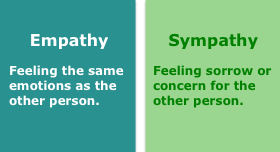Dana Leavy presents an interesting perspective on career storytelling in What’s Your Story, Morning Glory? Building the Story Behind Your Personal Brand.
She suggests both knowing the bigger narrative behind your brand, as well as the smaller stories that inspire it.
Here, Leavy connects empathy vs. sympathy to telling those smaller stories:
… it’s important that you be able to relate on both an intellectual and emotional level to what I do in a way that makes you essentially want to hire me. … That connection comes from telling the smaller stories behind your brand that your audience can relate to, place themselves in and empathize with. Don’t confuse this with sympathy — you’re not going to want to hire me simply because you feel bad for me and want to help me be successful (though I’d love it). Anyone can feel sympathetic to a cause, but empathy is about relating to that cause or message in a way that makes you want to engage with the person or persons who are delivering it. This is why I hate when job seekers go into interviews and spew out things like “I would REALLY love to work with your company…” They don’t care, because sympathy has zero to do with the hiring process. But illustrating your ability to effectively work through challenges, embrace change, and grow as a professional … now that has WOW factor.
I don’t see it as often as I used to, but job-seekers still do sometimes fall into the trap of “what your organization can do for me” vs. “what I can do for your organization.” I see it most often with younger, inexperienced job-seekers. In fact, in the prospective-intern videos on the Intern Sushi site that I wrote about last week, a common theme was “I want to work for your organization so I can gain experience.” That “what your organization can do for me” mentality is a little more forgivable in internship-seekers since gaining experience is, after all, what internships are all about. I’d still prefer to hire an intern who tells me what he or she can do for my organization.
But empathy is a significant reason that storytelling works in the job search, as I wrote in Tell Me About Yourself:
Stories establish an emotional connection between storyteller and listener and inspire the listener’s investment in the storyteller’s success. When stories convey moving content and are told with feeling, the listener feels an emotional bond with the storyteller. Often the listener can empathize or relate the story to an aspect of his or her own life. That bond instantly enables the listener to invest emotionally in your success.
The Information Age and the era of knowledge workers may seem cutting edge, but in his popular book, A Whole New Mind, Daniel Pink asserts that society has moved beyond that mindset and into the Conceptual Age in which we are “creators and empathizers,” “pattern recognizers,” and “meaning makers.” Story is an important tool in this age because it enables us to “encapsulate, contextualize, and emotionalize.” Pink refers to story as “context enriched by emotion” and tells us that “story is high touch because stories almost always pack an emotional punch.” Gerry Lantz of Stories That Work, a firm that uses stories in branding, compares stories to information, noting that stories are accessible, involving, evocative, meaningful, and a product of the creative right brain, while information is processed through the rational left brain through analysis, interpretation, evaluation, and planning. Both information and stories are necessary.
Leavy goes on to suggest that job-seekers and careerists have no choice but to craft their stories …
Obviously you’re not going to walk into an interview and start telling your life story. But you can create a compelling story around your career that shapes your personal brand by really conveying the message of why you’re a valuable asset to a company.
Thus your story can both shape and support your personal career brand. In Tell Me About Yourself, I talk about the story behind your branding statement and offer some examples you can read about here.
Leavy concludes with a nice list of elements to keep in mind with creating a story to shape your brand:
- Talk about what drove or inspired you to become involved in your field. Did you have any mentors, or people that you looked up to, or perhaps an event that really inspired you to do this type of work? What was it that really pushed you over the edge and inspired you to take action?
- What do you think are the most beneficial tools, skills and resources that you picked up along the way?
- What challenges did you encounter along the way, and more importantly, how did you work through those challenges to grow and learn?
- How have you used the lessons you’ve learned by tackling those challenges to get you to this point of knowing you’d like to work for this company, or be in this role?
- What aspects of your professional journey do you consider particularly unique and why?
- How will your past experiences make you successful in this particular role, and contribute to the goals of the organization?
